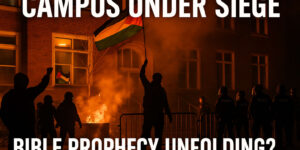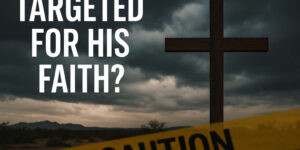The Great Awakening Revival
George Whitefield had attended Oxford with John and Charles Wesley, who began the Methodist revival movement within the Anglican Church.
In 1733, when he finally understood and believed the Gospel, George Whitefield exclaimed:
“Joy-joy unspeakable-joy that’s full of, big with glory!”
Beginning in 1740, George Whitefield preached seven times in America. He spread the Great Awakening Revival, which helped unite the Colonies prior to the Revolutionary War.
Whitefield‘s preaching stirred crowds with enthusiasm, which was criticized by the formal, established churches of the day. When they closed their doors to him, Whitefield began preaching out-of-doors. Crowds grew so large that no church could have held the number of people, sometimes being as large as 25,000.
Ben Franklin wrote in his autobiography that George Whitefield’s voice could be heard over 500 feet away:
“He preached one evening from the top of the Courthouse steps … Streets were filled with his hearers … I had the curiosity to learn how far he could be heard by retiring backwards down the street … and found his voice distinct till I came near Front-street.”
Franklin continued his description of evangelist George Whitefield:
“Multitudes of all denominations attended his sermons … It was wonderful to see the change soon made in the manners of our inhabitants. From being thoughtless or indifferent about religion, it seemed as if all the world were growing religious, so that one could not walk thro’ the town in an evening without hearing psalms sung in different families of every street.”
At a time in history when most countries had established state religions which mandated doctrinal adherence, it was novel for Whitefield to champion in America freedom of conscience, for people to have the opportunity to make a voluntary choice to believe the Gospel.
This controversy was called “Old Lights,” who emphasized tradition, versus “New Lights,” who were open to a move of the Holy Spirit.
Sarah Edwards, the wife of Jonathan Edwards, wrote to her brother in New Haven concerning the effects George Whitefield’s ministry:
“It is wonderful to see what a spell he casts over an audience by proclaiming the simplest truths of the Bible … Our mechanics shut up their shops, and the day laborers throw down their tools to go and hear him preach, and few return unaffected.”
George Whitefield was one of the first ministers to publicly preach the Gospel to slaves. This profoundly influenced many preachers, such as Rev. Samuel Davies, and denominations, such as Baptists, Methodists and Quakers, to be inclusive of blacks.
A young black teenager named John Marrant heard Whitefield preach in Charleston, South Carolina. Marrant converted and went on to become one of America’s first black preachers, even preaching among Cherokee, in England and in Nova Scotia.
Breaking News. Spirit-Filled Stories. Subscribe to Charisma on YouTube now!
George Liele, a black slave in Georgia, heard a Great Awakening preacher. He converted and began preaching with such conviction that his master freed him. Liele founded one of America’s first black churches–Silver Bluff Baptist Church in Beach Island, South Carolina, 1773, and then became one of America’s first foreign missionaries, arriving in Jamaica in 1792.
George Whitefield advocated for the improvement of the treatment of slaves, though he sadly held the typical 18th century view which accommodated the institution of slavery.
It was not until 1770 that Pennsylvania Quaker Anthony Benezet pioneered the movement to abolish slavery by founding the Negro School at Philadelphia, and, in 1775, the Society for the Relief of Free Negroes Unlawfully Held in Bondage, of which Franklin became the president in 1785.
Benezet’s school was inspired by Whitefield, who had first proposed in 1739 that Philadelphia have a Charity School for blacks and poor orphan children. Franklin later merged the Charity School with his newly formed Academy of Philadelphia.
Franklin helped finance the building of an auditorium for Whitefield to preach in, after which it became one of the first buildings of the Academy, which turned into the University of Pennsylvania.
For over a century, a bronze statue of George Whitefield has stood on Pennsylvania University’s campus, in the Dormitory Quadrangle near Ware College House. In 2020, as part of the “cancel culture,” the University voted to remove the statue.
This tactic, also called “deconstruction,” is a process of intentionally separating a nation from its past in order to transition into a socialist future.
Deconstruction, or cancel culture, was part of:
- The French Revolution tearing down the statue of Good King Henry IV, 1792, and publicly burning the remains of Ste. Genevieve, the Patron Saint of Paris, 1793;
- Stalin’s changing the name of St. Petersburg to Leningrad, 1924;
- Mao Zedung’s “Great Leap Forward,” 1953-1962, and “Cultural Revolution,” 1966-1976, which destroyed innumerable Chinese artifacts, including Beijing’s ancient Gate of China, and the Luoyang White Horse Temple–the oldest Buddhist temple in China.
- Pol Pot’s Khmer’s Rouge in Cambodia, 1975-1979, which killed anyone who wore eye-glasses, since if they could read they knew history, which needed to be erased;
- Taliban and ISIS, which destroyed ancient Assyrian and Buddhist statues and artifacts during Islamic jihad in Iraq and Syria, 2014-2016.
George Orwell wrote of this tactic in his socialist dystopian novel “1984”:
“Every record has been destroyed or falsified, every book rewritten, every picture has been repainted, every statue and street building has been renamed, every date has been altered … Nothing exists except an endless present in which The Party is always right.”
George Whitefield’s preaching and the Great Awakening Revival resulted in the founding of many respected American universities, such as:
- Princeton
- Brown
- Dartmouth
- Rutgers
- Columbia
Franklin printed Whitefield’s journal and sermons. Being Postmaster in Philadelphia, Franklin helped spread Whitefield’s sermons through colonial America.
In one sermon, George Whitefield proclaimed:
“Never rest until you can say, ‘the Lord our righteousness.’ Who knows but the Lord may have mercy, nay, abundantly pardon you? Beg of God to give you faith; and if the Lord give you that, you will by it receive Christ, with his righteousness, and his all … None, none can tell, but those happy souls who have experienced it with what demonstration of the Spirit this conviction comes …”
Whitefield continued:
“Oh, how amiable, as well as all sufficient, does the blessed Jesus now appear! With what new eyes does the soul now see the Lord its righteousness! Brethren, it is unutterable … Those who live godly in Christ, may not so much be said to live, as Christ to live in them … They are led by the Spirit as a child is led by the hand of its father … They hear, know, and obey his voice … Being born again in God they habitually live to, and daily walk with God.”
George Whitefield’s influence was so profound, that when there was a threatened war with Spain and France, Ben Franklin drafted and printed a General Fast for Pennsylvania, December 12, 1747:
“As the calamities of a bloody War, in which our Nation is now engaged, seem every Year more nearly to approach us … there is just reason to fear that unless we humble ourselves before the Lord & amend our Ways, we may be chastised with yet heavier Judgments. We have, therefore, thought fit … to appoint … the seventh Day of January next, to be observed throughout this Province as a Day of Fasting & Prayer, exhorting all … to join with one accord in the most humble & fervent Supplications; That Almighty God would mercifully interpose and still the Rage of War among the Nations & put a stop to the effusion of Christian Blood.”
In 1752, George Whitefield wrote to Benjamin Franklin, who had invented the lightning rod:
“My Dear Doctor … I find that you grow more and more famous in the learned world.”
In 1764, George Whitefield received a letter from Benjamin Franklin, in which Franklin ended with the salutation:
“Your frequently repeated Wishes and Prayers for my Eternal as well as temporal Happiness are very obliging. I can only thank you for them, and offer you mine in return.”
Franklin wrote to Whitefield:
“I sometimes wish you and I were jointly employed by the Crown to settle a colony on the Ohio … a strong body of religious and industrious people! … Might it not greatly facilitate the introduction of pure religion among the heathen, if we could, by such a colony, show them a better sample of Christians than they commonly see in our Indian traders?”
In 1769, Whitefield wrote Franklin on the night before his last trip to America. In this last surviving letter, Whitefield shares his desire that both he and Franklin would:
“… be in that happy number of those who is the midst of the tremendous final blaze shall cry Amen.”
Whitefield founded an orphanage in Georgia. He left it to Selina Shirley, the Countess of Huntingdon, who had financially helped both Whitefield and John Wesley in the spread of Methodism. She financed the construction of 64 chapels in Wales and England, supported missions in Sierra Leone, Africa, and was the first female principal of Trefeca College in Wales, which educated Methodist ministers.
The Countess of Huntingdon was patron of the famous black female poet, Phillis Wheatley. Phillis Wheatley corresponded with John Newton, author of the song Amazing Grace, and General George Washington, who was so impressed with her writing that he met with her at his headquarters in Cambridge.
George Whitefield died September 30, 1770. As he was dying, he declared:
“How willing I would ever live to preach Christ! But I die to be with Him!”
The famous black poet, Phillis Wheatley, wrote in her poem, “On the Death of the Rev. Mr. George Whitefield,” (1770):
“HAIL, happy saint, on thine immortal throne, Possest of glory, life, and bliss unknown; We hear no more the music of thy tongue, Thy wonted auditories cease to throng. Thy sermons in unequall’d accents flow’d, And ev’ry bosom with devotion glow’d; Thou didst in strains of eloquence refin’d Inflame the heart, and captivate the mind. … Unhappy we the setting sun deplore, So glorious once, but ah! it shines no more. Behold the prophet in his tow’ring flight! He leaves the earth for heav’n’s unmeasur’d height, And worlds unknown receive him from our sight. There Whitefield wings with rapid course his way, And sails to Zion through vast seas of day. Thy pray’rs, great saint, and thine incessant cries Have pierc’d the bosom of thy native skies. … Thou moon hast seen, and all the stars of light, How he has wrestled with his God by night. He pray’d that grace in ev’ry heart might dwell, He long’d to see America excel; He charg’d its youth that ev’ry grace divine Should with full lustre in their conduct shine; That Saviour, which his soul did first receive, The greatest gift that ev’n a God can give, He freely offer’d to the num’rous throng, That on his lips with list’ning pleasure hung. … Take him, ye wretched, for your only good, Take him ye starving sinners, for your food; Ye thirsty, come to this life-giving stream, Ye preachers, take him for your joyful theme; Take him my dear Americans, he said, Be your complaints on his kind bosom laid: Take him, ye Africans, he longs for you, “Impartial Saviour is his title due: Wash’d in the fountain of redeeming blood, You shall be sons, and kings, and priests to God. … Great Countess, we Americans revere Thy name, and mingle in thy grief sincere; New England deeply feels, the Orphans mourn, Their more than father will no more return. But, though arrested by the hand of death, Whitefield no more exerts his lab’ring breath, Yet let us view him in th’ eternal skies, Let ev’ry heart to this bright vision rise; While the tomb safe retains its sacred trust, Till life divine re-animates his dust.”
In one of his sermons, George Whitefield declared:
“Would you have peace with God? Away, then, to God through Jesus Christ, who has purchased peace; the Lord Jesus has shed his heart’s blood for this. He died for this; he rose again for this; he ascended into the highest heaven, and is now interceding at the right hand of God.”
This article originally appeared on American Faith, and is reposted with permission.
Join Charisma Magazine Online to follow everything the Holy Spirit is doing around the world!






































